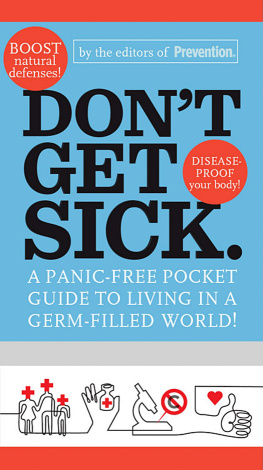C onsidering that some 500 million rhinovirusesthe culprit behind the common coldcan fit on the head of a pin, its an understatement to say that we humans are outnumbered by the disease-causing microorganisms in our environment. That we dont get sick more often is pretty amazing. We have our immune systems to thank.
You might think of your immune system as your bodys own personal Secret Service detail. While youre going about your business, its keeping an eye out for viruses, bacteria, and other disease-causing microbes. When it spies a potential troublemaker, it radios for backup, in the form of immune-cell specialists that surround and take down the suspect organisms. And its on alert 247.
Reality Check

If you go outside with wet hair, youll get sick.
The wet hair alone wont make you sick, says Erika Schwartz, MD, chief medical officer of www.healthandprevention.com. But the combination of cold air temperature and wet hair can lower your immunity and make you more vulnerable to viruses and bacteria. On the other hand, warming up your extremitiesespecially your headhelps support your immune system.
So while medical science hasnt directly linked any health risks to going outside with wet hair, theres really no good reason to do it. As Dr. Schwartz says, Why take the risk if the solution is as simple as taking a few minutes to dry your hair?
Most germs arent wily enough to outsmart this sophisticated system. But every once in a while, one of them evades detection. A virus, for example, can masquerade as an acceptable substance or take cover inside or between red blood cells. If its novel, meaning that your immune system hasnt encountered it before, its more likely to slip past unnoticed.
Sometimes the immune system itself isnt operating up to snuff. Poor eating and lifestyle habits, chronic disease, and even age can take a toll. You might not be able to change your age (if only!), but you can do a lot to reinforce and strengthen your immune function, as youll see in the chapters ahead. A robust immune system is still your best defense against infection. Then germs will have to find someplace else to do their dirty work.
White (Blood Cell) in Shining Armor
At any moment, your body is under assault from countless microorganisms that want to cause harm. Often they gain entry through tiny cuts and abrasions in your skin or through natural portals like your nasal passageways. Once inside, each kind of organism has its own modus operandi. But not to worry: Your immune system is ready to respond.
What may be most impressive about your immune system is its ability to distinguish friend (that is, your own cells) from foe(viruses and bacteria, for example). Your cells carry markers that act as biochemical ID cards, allowing your immune system to recognize them as official members of the club known as your body. Those substances without markers are called antigens. Their lack of proper ID draws the attention of your immune system, which quickly dispatches leukocytes to investigate the intruders.
Leukocytes are white blood cells that take several different forms, each with a particular disease-fighting skill. Some are adept at recognizing and destroying foreign substances, while others form antibodies to them. If and when an antigen attempts a return appearance, antibodies will promptly escort them from your body.

Know the Lingo
As you read about infectious illness in this book and elsewhere, youll come across terminology thatlets face itdoesnt exactly put your mind at ease. H1N1? Sounds like a top-secret government project. Outbreak? Could be the title of a science-fiction movie.
Simply getting a handle on what these terms mean can offset the fear factor and give proper perspective to all the hyperbolic headlines. Heres a glossary to help.
Avian flu
An influenza-A virus that occurs naturally among wild birds. Some strains dont cause major problems, while otherssuch as H5N1, which can spread from birds to humanscan be quite serious. Generally, the risk to humans is low. Symptoms are similar to seasonal flu, though complications such as pneumonia and acute respiratory disease have been reported.
Epidemic
The spread of a disease within a specific region or country.
Influenza virus
A virus that causes influenza. There are three types: A, which is prevalent in humans and animals such as birds, pigs, and whales; B, which occurs only in humans; and C, found in humans, pigs, and dogs. Type C usually doesnt cause outbreaks.
MRSA (pronounced MER-sa)
Short for methicillin-resistant Staphylococcusaureus, a bacterium that causes staph infection. As its name suggests, it resists treatment with several common antibiotics. MRSA commonly occurs in hospital settings, though it can pass from one person to another through skin-to-skin contact.
Outbreak
The spread of a disease over a short period of time in a specific region.
Pandemic
The spread of a viral disease across a large geographic area that meets these three criteria:
 The virus is new, and the human body hasnt developed a natural immunity to it.
The virus is new, and the human body hasnt developed a natural immunity to it.











 Know the Lingo
Know the Lingo The virus is new, and the human body hasnt developed a natural immunity to it.
The virus is new, and the human body hasnt developed a natural immunity to it.